Luis Inscio Lula Da Silva
Luiz Inácio Lula da Silva, initially Luiz Inácio da Silva, byname Lula, (conceived October 27, 1945, Garanhuns, Brazil), Brazilian legislator who filled in as leader of Brazil from 2003 to 2011.
Early life and begin in governmental issues
Brought into the world in Pernambuco state to sharecropping guardians, Luiz Inácio da Silva ("Lula" was a moniker that he later added to his legitimate name) functioned as a shoe-sparkle kid, road merchant, and assembly line laborer to assist with enhancing the family pay. During the downturn that followed the tactical upset of 1964 in Brazil, he found work with the Villares Metalworks in São Bernardo do Campo, a modern suburb of São Paulo. At Villares he joined the Metalworkers' Union, and in 1972 he passed on the plant to work for the association full time, heading its legitimate segment until 1975 when he was chosen association president. That post brought him public consideration
As he sent off a development for wage expansions contrary to the tactical system's financial strategy. The mission was featured by a progression of strikes from 1978 to 1980 and finished in Lula's capture and prosecution for infringement of the National Security Law. In spite of the fact that he was sentenced and condemned to a jail term of three and a half years, the Military Supreme Court delivered him the next year.
An establishing individual from the Workers' Party (Portuguese: Partido dos Trabalhadores), Lula previously campaigned for political position as his party's possibility for legislative head of the territory of São Paulo in 1982, completing fourth. He later drove public endeavors for direct decisions for president, arranging mass
Exhibits in state capitals in 1983 and 1984. Floated by prevalence and magnetism, Lula was chosen for the public Chamber of Deputies in 1986 as a government representative from São Paulo. Lula was the Workers' Party's official up-and-comer in 1989, however he lost to Fernando Collor de Mello. Lula went on as his party's official competitor in the appointment of 1994 and 1998, the twice completing second to Fernando Henrique Cardoso. In the 2002 official political race he embraced a more commonsense stage; in spite of the fact that he stayed focused on empowering grassroots support in the political cycle, he likewise sought business pioneers and vowed to work with the
Worldwide Monetary Fund to meet financial targets. Lula definitively crushed
Financial targets. Lula definitively crushed José Serra, the public authority upheld up-and-comer, by winning 61.5 percent of the vote.
Administration
Subsequent to getting to work in January 2003, Lula tried to work on the economy, sanction social changes, and end government debasement. In 2006, as the finish of his initial term drew closer, the economy was developing, and Brazil's neediness rate had fallen altogether. In any case, numerous Brazilians felt that Lula had not done what's necessary to work on the nature of government funded training or to diminish wrongdoing. In addition, Lula's commitment to battle government debasement had come into question in 2005, when individuals from his party were
Blamed for pay off and unlawful mission funding. The president was not ensnared, however the outrage hurt his fame. In the main round of the 2006 official political race, Lula neglected to catch an adequate number of votes to win through and through. By and by, in the second round he effortlessly crushed his rival, Geraldo Alckmin of the Brazilian Social
A majority rules system Party.
Both the Brazilian economy and Lula's prominence kept on developing during his subsequent term, and new oil revelations in the Santos bowl held extraordinary commitment for the nation's future, which looked considerably more brilliant when Rio de Janeiro was decided to have the 2016 Summer Olympic Games. Unavoidably banned from running for a third continuous
Term, Lula handpicked his head of staff, Dilma Rousseff, as his replacement. Promising to expand Lula's strategies, Rousseff, who had been the go-to person for the organization's milestone Growth Acceleration Program, progressed from the primary round of races to a spillover against Serra, whom she crushed convincingly to be chosen Brazil's most memorable lady president.
-
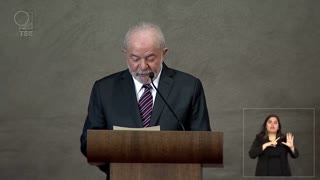 29:59
29:59
ASJSportTraining
1 year ago $0.06 earnedBRAZIL WAS STOLEN 🩸🇧🇷 | SOLEMNITY - LULA DA SILVA AND ALCKMIN ARE GRADUATED AT TSE
70 -
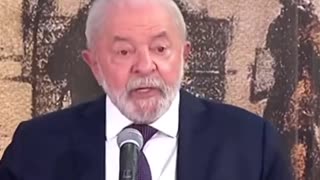 0:40
0:40
ASJSportTraining
1 year agoLULA DA SILVA: "BNDES WILL FINANCE WORK ON AN ARGENTINE GAS PIPELINE"
1511 -
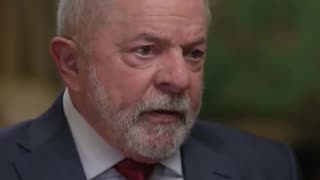 3:18
3:18
ASJSportTraining
1 year agoLULA DA SILVA IS INTERVIEWED BY CNN
62 -
 1:41
1:41
Leomont83
1 year agoTHE IARA by Olavo Bilac (Rio de Janeiro, RJ, Brazil, 1865-1918)
163 -
 1:15
1:15
Leomont83
1 year agoRecitation of ROSE MYSTIC by Leandro Monteiro (Taubaté, São Paulo, Brasil, 1983)
5 -
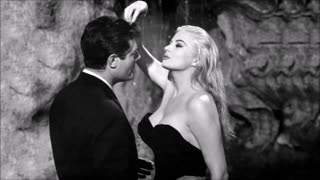 51:16
51:16
The Memory Hole
3 months agoFederico Fellini on La Dolce Vita (1962)
927 -
 27:52
27:52
LeeMack912
2 years agoCasa Cuevas Mandarria Edition Limitada | #leemack912 (S07 E88)
10 -
 0:10
0:10
Hogwords
1 year agoWaterloo di Pier-Giorgio Tomatis, romanzo fanta-storico
17 -
![Lo zio KLAUS SCHWAB spiega il suo piano di prendere il controllo degli umani attraverso il suo vivaio di "figliocci" comprati e portati al comando delle nazioni [in descrizione gli elenchi in pdf originale]](https://hugh.cdn.rumble.cloud/s/s8/6/X/A/Y/I/XAYIr.0kob.1.jpg) 1:02
1:02
Roberto1965
18 days ago $0.04 earnedLo zio KLAUS SCHWAB spiega il suo piano di prendere il controllo degli umani attraverso il suo vivaio di "figliocci" comprati e portati al comando delle nazioni [in descrizione gli elenchi in pdf originale]
154 -
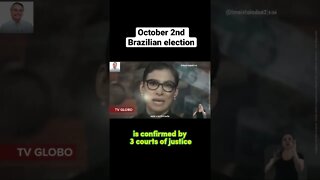 0:57
0:57
EvertonFree11
1 year ago#1 Brazil, the last frontier against socialism/communism in Latin America @jairbolsonaro we need you
115